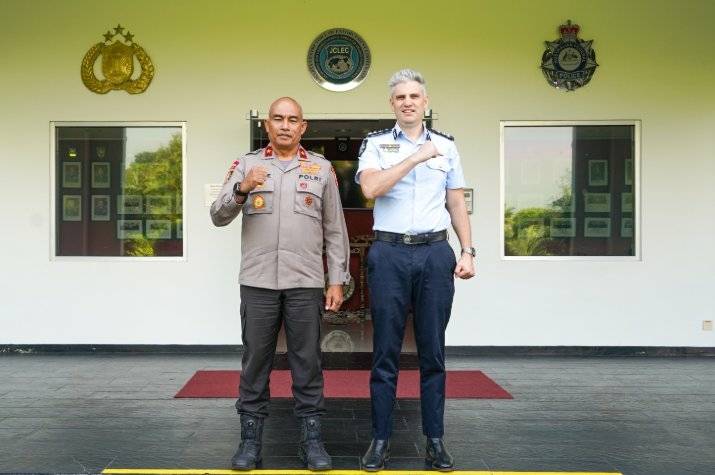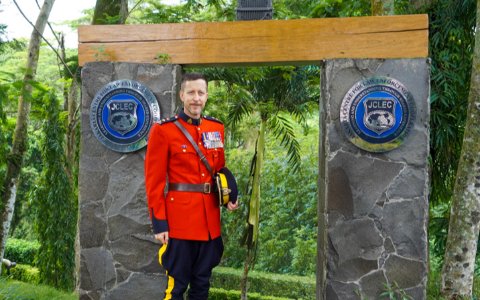RCMP leads capacity-building efforts in Indonesia
By Mara Shaw

As global threats continue to rise, international cooperation and a strong global policing strategy are more critical than ever.
Image by RCMP
September 30, 2025
Content
In an increasingly interconnected world, threats to the safety and security of Canadians can come from far outside our borders. That's why the RCMP is taking a leading role alongside allied partners, in building police capacity around the globe.
The countries of Southeast Asia and the South Pacific face growing transnational threats, such as cybercrime and human smuggling. By bolstering strong police services in this region, the RCMP helps to build a more integrated criminal intelligence network and allows for enforcement actions against criminals who would otherwise be beyond our reach. These efforts benefit both local communities and Canadians by addressing threats before they reach our shores.
The Jakarta Centre for Law Enforcement Cooperation (JCLEC) is a police training academy based in Indonesia and serves as a hub to train law enforcement personnel throughout the region. Superintendent Ryan Mitchell, from Federal Policing and International Policing leads Canada's capacity building efforts in the region. He says since 2004, the RCMP and allied partners have trained more than 46,000 police personnel at the JCLEC.
The driving force behind these efforts is rooted in people development. Federal and International Policing officers work together with global partners to share expertise, build trust and facilitate change.
Chief Superintendent Wendy Mehat is a detachment commander in British Columbia, and a second-generation South-Asian Canadian. She recently led a women in policing leadership program at the JCLEC. The program brought together women in high-ranking roles from across the South Pacific to train in a women-only space —something many of them had never experienced before.
"Many of the women face challenges and the stigma of leadership from their community, government officials, and even their commanders," says Mehat.
From silence to strength
Mehat and fellow British Columbia-based officer, Superintendent Michelle Tansey developed a customized curriculum, weaving together modules on character-based leadership, emotional intelligence and the DISC (dominance, influence, steadiness, and conscientiousness) personality profile system. Their goal was to help the 25-person training cohorts understand their impact as leaders, communicate more effectively, and draw strength from their own personal experiences. A large part of the RCMP's own modernization efforts include embedding character-based leadership at all levels to emphasize the importance of personal integrity and core ethics in guiding others.
As someone who's faced her own cultural barriers, Mehat says she was able to connect on a deeper level with many of the women. "I was also able to pull from my own personal experiences leading through the complexities of crisis," says Mehat. "That resonated with many of the women because they come from countries with extreme violence."
The participants were able to speak freely about their experiences, away from environments where their voices aren't always heard.
"They are in command roles, but their command is sometimes secondary," notes Mehat. "The basis of the course was also reassuring them that they have a network, and that there's resilience in policing through incredibly difficult times." She says that many of the women said they left feeling empowered to lean into their strengths as women when they returned to their detachments.
Unified efforts for lasting impact
This training is a part of broader RCMP efforts in the Indo-Pacific region centred on the headquarters at JCLEC. The training centre was established in response to the 2002 Bali bombings, where 202 people died and another 240 were injured. Following that tragedy, the Australian Federal Police (AFP) recognized the need for revolutionary policing reform and acted with the Indonesian National Police to create JCLEC, inviting the RCMP to be a partner from the start.
"We're grateful for the ongoing commitment from Canada who has proven itself to be a strong partner for both Australia and Indonesia in the region," says AFP Commander Danny Caruana, who has a key leadership role at the school. "We look forward to continuing this partnership into the future."Courses cover everything from evolving threats like cybercrime, drug and human trafficking, to workplace competencies like leading with emotional intelligence. The approach to centralize training efforts creates efficiencies to reduce overlap and allows agencies to be more strategic in their course delivery. Each partner agency brings its unique areas of expertise, with the RCMP recently specializing in surveillance, cybersecurity, and leadership development.
"I didn't want to come here and do what everyone else was doing," says Mitchell, reflecting his tenacity to transform the RCMP's capacity building efforts. "In my past experiences as a liaison officer and peacekeeper, I remember global policing partners would each offer their version of a course, but there was no architecture to synchronize efforts and build out governance models that worked for the partner services. In our current environment, everyone has limited human and financial resources so we can't afford to duplicate efforts."
Mitchell says that programs like the women in policing initiative and other RCMP-led programs are both teaching skills and helping to build long-term partnership and intercontinental networks which help the liaison officers and detect threats before they can get to Canada.

Foreign investments yield dividends at home
The exchange works both ways. Canadian officers stay abreast of trends and techniques by having face to face dialogue with their closest allies.
Superintendent Eric Gordon, the Regional Director for the Indo-Pacific, reinforces the value of these exchanges. "We've had recent success in disrupting human trafficking groups that wouldn't have been possible without being able to leverage the networks we've built through our involvement with JCLEC," says Gordon. "These networks also allow for collaboration between for local partners as well, where those channels didn't exist before."
These efforts are leading to other tangible outcomes, like the shift from one-time training courses to long-term mentorship. Through a new initiative spearheaded by Tansey and Mehat, graduates of the Women in Policing program will have access to an ongoing mentorship network supported by RCMP mentors to help them navigate workplace challenges and continue growing in their leadership roles.
The work isn't without its own hurdles. Policing in the Indo-Pacific regions varies in terms of legal systems, resources, and practices from country to country. By coordinating with international partners, the RCMP avoids duplication and ensures training is adapted to each country's context.
Looking ahead, both Mitchell and Gordon echo hopes to stabilize the pace of course delivery at JCLEC, and continue to offer up to 25 courses annually. "The dedicated funding envelope from Global Affairs Canada has allowed us to scale our delivery for sustained success," says Gordon.
In a world where criminal activity knows no borders, Canada's own security is reinforced by partnerships like these. These global efforts rooted in strategy and mutual respect are just some of the ways the RCMP is shaping the landscape of policing both at home and abroad.